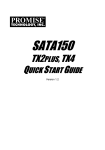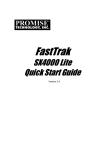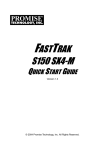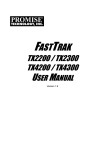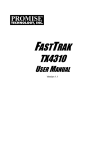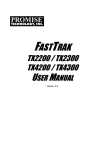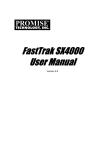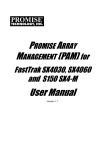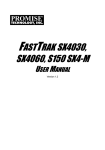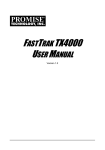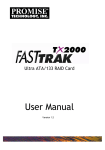Download Promise Technology 150TX2 User manual
Transcript
FASTTRAK S150 TX2PLUS QUICK START GUIDE Version 1.2 FastTrak S150 TX2plus Copyright © 2003 Promise Technology, Inc. No part of this manual may be reproduced or transmitted in any form without the expressed, written permission of Promise Technology. Trademarks Promise, and the Promise logo are registered in U.S. Patent and Trademark Office. All other product names mentioned herein may be trademarks or registered trademarks of their respective companies. Important Data Protection Information You should back up all data before installing any drive controller or storage peripheral. Promise Technology is not responsible for any loss of data resulting from the use, disuse or misuse of this or any other Promise Technology product. Notice Although Promise Technology has attempted to ensure the accuracy of the content of this manual, it is possible that this document may contain technical inaccuracies, typographical, or other errors. Promise Technology assumes no liability for any error in this publication, and for damages, whether direct, indirect, incidental, consequential or otherwise, that may result from such error, including, but not limited to loss of data or profits. Promise Technology provides this publication “as is” without warranty of any kind, either express or implied, including, but not limited to implied warranties of merchantability or fitness for a particular purpose. The published information in the manual is subject to change without notice. Promise Technology reserves the right to make changes in the product design, layout, and driver revisions without notification to its users. Contents Step 1: Unpack Your FastTrak Card ................................................................... 3 Step 2: Install the FastTrak Card......................................................................... 4 Step 3: Install the Hard Drives............................................................................. 5 Step 4: Create Your Disk Array ........................................................................... 7 Creating a Performance Array .............................................................. 8 Creating a Security Array with New Drives ........................................... 9 Creating a Security Array with an Existing Data Drive ........................ 11 Creating a Security Array with Quick Initialization............................... 14 Step 5: Install Software Drivers ......................................................................... 16 2 Quick Start Guide Step 1: Unpack Your FastTrak Card When you receive the FastTrak S150 TX2plus card, the package should contain the items listed below: • • • • • • • FastTrak S150 TX2plus RAID Controller Card Quick Start Guide FastTrak S150 TX2plus driver diskette Two internal 4-wire Serial ATA hard drive data cables One internal 40-pin Parallel ATA data cable One Y power splitter cable CD with Drivers, Promise Array Management (PAM) utility, PAM User Manual and FastTrak S150 TX2plus User Manual If ANY of the contents are missing or appear to be damaged, please contact your dealer or distributor immediately. Warning Before installing the adapter into an existing system, backup any important or useful data. Failure to follow this accepted PC practice could result in data loss. Warning The FastTrak S150 TX2plus Ultra ATA/Serial ATA RAID Controller card, like other parts of your system, is subject to damage by static electricity. Be sure that you’re properly grounded (Promise recommends that you wear an anti-static strap or touch a grounded object) and that you unplug your system before installing FastTrak. 3 FastTrak S150 TX2plus Step 2: Install the FastTrak Card The FastTrak TX2plus Serial ATA RAID card fits into any available PCI slot on your PC’s motherboard (see Figure 1, below): • • 1. 32-bit PCI slot (must be PCI 2.2 or 2.3 compliant) The 32-bit portion of a 64-bit PCI slot Remove the cover of your system. 2. Remove the inside slot cover of an available 32-bit PCI slot on the motherboard. 3. Install the FastTrak Serial ATA RAID card into the open slot (see Figure 1 below). Secure the bracket to the system’s frame. 4. Attach your system case’s 2- or 4-pin LED cable to the LED connector on the FastTrak S150 TX2plus RAID card (see Figure 2, on page 6). Make sure that pin 1 on the connector is aligned with pin 1 of the cable. 5. Fasten the controller card bracket to the system case (see below). Figure 1. Insert the FastTrak card into an open PCI slot 4 Quick Start Guide Step 3: Install the Hard Drives Important If you wish to include your current bootable Serial ATA drive using the Windows NT 4.0, Windows 2000, or Windows XP operating system as part of a bootable Mirrored (RAID 1) array on your FastTrak Serial ATA RAID card, do NOT connect the hard drive to the FastTrak yet. You MUST install the Windows NT4, 2000, or XP driver software first onto this drive while it is still attached to your existing hard drive controller. The FastTrak Serial ATA RAID card supports up to two Serial ATA hard drives and up to two Ultra ATA/133 drives. For optimal performance, install two identical Serial ATA drives and two identical Ultra ATA drives of the same model and capacity. The drives’ matched performance allows the array to function better as a single drive. If you are striping (RAID 0) for performance, use up to four new drives. If mirroring (RAID 1) for protection, you can use two new drives OR use an existing drive and a new drive (the new drive must be the same size or larger than the existing drive). 1. Install the hard drives into the hard drive bays of your system, including the power cables. Caution Use of removable hard drive enclosures other than Promise Technology’s SuperSwap is not supported and may result in performance loss or other undesired results. 2. Attach one Serial ATA data cable to each Serial ATA hard drive. Then attach the other ends of the cables to the connectors on the FastTrak TX2plus RAID card. 3. Attach a black connector of the Ultra ATA cable to each Parallel ATA hard drive. 4. Attach the blue cable connector to the Port 3 Parallel connector on the FastTrak S150 TX2plus controller card. The colored edge of the cable(s) indicates pin 1 (see Figure 2). 5 FastTrak S150 TX2plus Port 2 (Serial) for future use FastTrak Port 3 (Parallel) Port 1 (Serial) Pin 1 TX2 plus 150 LED Pins Figure 2. FastTrak S150 TX2plus card 5. Attach the Y-cable power splitters to the Serial ATA hard drives. 6. Use existing power cables for the Parallel ATA hard drives. Note The FastTrak S150 TX2plus RAID controller is a PCI Plug-n-Play (PnP) device. No changes are necessary in the Motherboard CMOS Setup for resources or drive types in most applications. 6 Quick Start Guide Step 4: Create Your Disk Array You will now use the onboard FastBuild™ BIOS utility to create your array using the attached drives. There are three different scenarios in creating this array. You can create an array for: • • • • Performance 1. Boot your system. If this is the first time you have booted with the FastTrak S150 TX2plus card and drives installed, the Promise onboard BIOS will display the following screen. Security, using new hard drives (recommended) Security, using an existing hard drive and a new one Security, using Quick Initialization The first three steps are the same for all three choices. After that, follow the steps for the array you want to create. FastTrak S150 TXx (tm) BIOS Version 1.aa (Build xxxx) (c) 2002-2005 Promise Technology, Inc. All Rights Reserved No array defined . . . Press <Ctrl-F> to ender FastBuild (tm) Utility Or press <ESC> key to continue booting the system 2. Press the Ctrl-F keys to display the FastBuild Utility Main Menu. 3. Press “1” to display the Auto Setup Menu below. This is the fastest and easiest method to creating your first array. 7 FastTrak S150 TX2plus FastBuild (tm) Utility 2.xx (c) 2002-2005 Promise Technology, Inc. [Auto Setup Options Menu] Optimize Array for: Performance [ Auto Setup Configuration ] Mode ....................................................................... Stripe Spare Drive ............................................................. 0 Drives used in Array ................................................ 2 Array Disk Capacity................................................. 160048 [ Keys Available ] [↑] Up [↓] Down [←, →, Space] Change Option [ESC] Exit [Ctrl-Y] Save Creating a Performance Array FastTrak S150 TX2plus enables you to create striped or mirrored arrays with 1, 2, 3, or 4 drives. To create an array for best performance, follow these steps: 1. Press the Spacebar to choose Performance under the Optimize Array for section. 2. 3. 4. Press Ctrl-Y to Save and create the array. Reboot your system. Once the array has been created, you will need to FDISK and format the array as if it were a new single hard drive. Once the arrayed drives have been formatted, proceed to Chapter 4 of this Manual to install your operating system and/or FastTrak driver. 5. 8 Quick Start Guide Creating a Security Array with New Drives Caution With some models of hard drives, if the Master hard drive fails, it may cause the Slave hard drive to be unrecognized by the computer's operating system. Where a RAID 1 (Mirroring) array exists on the Master/Slave pair, this condition may cause the operating system to freeze. Do NOT create a RAID 1 (Mirroring) array with two Parallel ATA hard drives using the Master/Slave arrangement on Channel 3 (the Parallel ATA port). You can create a RAID 1 (Mirroring) array by combining hard drives on: • Channels 1 and 2 (Serial ATA only) • Channels 1 and 3 (one Serial, one Parallel) • Channels 2 and 3 (one Serial, one Parallel) Under the Security setting, FastTrak S150 TX2plus permits two drives to be used for a single Mirrored array or four drives to be used for a Mirrored/Striped array in Auto Setup. Note When creating a Security array with new drives, a feature called Gigabyte Boundary will automatically be set to ON. For a description of this feature, see page 27 of the User Manual on the software CD. To create an array for data protection using new hard drives, follow these steps: 1. Press the Spacebar to choose Security under the Optimize Array for section. 2. 3. Press Ctrl-Y to Save your selection. The window below will appear. Do you want the disk image to be duplicated to another or do quick initialize or create only? Y - Create and Duplicate N - Create Only I - Create and Quick Initialize 4. Press N for the Create Only option. 9 FastTrak S150 TX2plus 5. A window will appear almost immediately confirming that your Security array has been created. Press any key to reboot the system. Array has been created. <Press Any Key to Reboot> 6. 7. Proceed with normal FDISK and format procedures as if you had just installed a new hard drive. Once the arrayed drives have been formatted, proceed to Chapter 4 of this Manual to install your operating system and/or FastTrak driver. 10 Quick Start Guide Creating a Security Array with an Existing Data Drive Caution With some models of hard drives, if the Master hard drive fails, it may cause the Slave hard drive to be unrecognized by the computer's operating system. Where a RAID 1 (Mirroring) array exists on the Master/Slave pair, this condition may cause the operating system to freeze. Do NOT create a RAID 1 (Mirroring) array with two Parallel ATA hard drives using the Master/Slave arrangement on Channel 3 (the Parallel ATA port). You can create a RAID 1 (Mirroring) array by combining hard drives on: • Channels 1 and 2 (Serial ATA only) • Channels 1 and 3 (one Serial, one Parallel) • Channels 2 and 3 (one Serial, one Parallel) Under the Security setting, FastTrak S150 TX2plus permits two drives to be used for a single Mirrored array or four drives to be used for a Mirrored/Striped array in Auto Setup. You would use this method if you wish to use a drive that already contains data and/or is the bootable system drive in your system. You will need another drive of identical or larger storage capacity. Warning If you are creating a Security array using an existing hard drive, backup any important data. Failure to do so could result in data loss. Important If you wish to include your current bootable drive using the Windows NT 4.0, Windows 2000, or Windows XP operating system as part of a bootable Mirrored (RAID 1) array on your FastTrak S150 TX2plus, do NOT connect the hard drive to the FastTrak yet. You MUST install the Windows NT4, 2000, or XP driver software first to this drive while it is still attached to your existing hard drive controller. See chapter 4 of this Manual. Follow these steps: 1. Press the Spacebar to choose Security under the Optimize Array for section. 11 FastTrak S150 TX2plus 2. Press Ctrl-Y to Save your selection. The window below will appear. Do you want the disk image to be duplicated to another or do quick initialize or create only? Y - Create and Duplicate N - Create Only I - Create and Quick Initialize 3. Press Y for the Create and Duplicate option. The window below will appear asking you to select the Source drive to use. FastBuild will copy all data from the Source drive to the Target drive. Channel:ID ----Channel:ID ----Channel:ID 1: 2: Source Disk Drive Model ----Target Disk Drive Model ----[Please Select A Source Disk] Drive Model SEAGATE S380023AS SEAGATE S380023AS Capacity (MB) ----Capacity (MB) ----Capacity (MB) 80024 80024 [↑] Up [↓] Down [ESC] Exit [Ctrl-Y] Save 4. 5. Use the arrow keys to choose which drive contains the existing data to be copied. Press Ctrl-Y to Save selection and start duplication. The following progress screen will appear. Start to duplicate the image . . . Do you want to continue? (Yes/No) Y – Continue N - Abort 6. Select Y to continue. If you choose N, you will be returned to step 1. 12 Quick Start Guide 7. Once complete, the following screen will appear confirming that your Security array has been created. Press any key to reboot the system. Array has been created. <Press Any Key to Reboot> 8. Once the arrayed drives have been formatted, proceed to Chapter 4 of this Manual to install your operating system and/or FastTrak driver. 13 FastTrak S150 TX2plus Creating a Security Array with Quick Initialization Caution With some models of hard drives, if the Master hard drive fails, it may cause the Slave hard drive to be unrecognized by the computer's operating system. Where a RAID 1 (Mirroring) array exists on the Master/Slave pair, this condition may cause the operating system to freeze. Do NOT create a RAID 1 (Mirroring) array with two Parallel ATA hard drives using the Master/Slave arrangement on Channel 3 (the Parallel ATA port). You can create a RAID 1 (Mirroring) array by combining hard drives on: • Channels 1 and 2 (Serial ATA only) • Channels 1 and 3 (one Serial, one Parallel) • Channels 2 and 3 (one Serial, one Parallel) Under the Security setting, FastTrak S150 TX2plus permits two drives to be used for a single Mirrored array or four drives to be used for a Mirrored/Striped array in Auto Setup. You would use this method if you wish to create a mirrored array and erase the early block from your existing drives. Warning Using the Quick Initialization option on existing drives will result in the loss of all data on those drives. Note When creating a Security array with new drives, a feature called Gigabyte Boundary will automatically be set to ON. For a description of this feature, see page 27 of the User Manual on the software CD. To create an array for data protection using new hard drives, follow these steps: 1. Press the Spacebar to choose Security under the Optimize Array for section. 2. Press Ctrl-Y to Save your selection. 3. The window below will appear. 14 Quick Start Guide Do you want the disk image to be duplicated to another or do quick initialize or create only? Y - Create and Duplicate N - Create Only I - Create and Quick Initialize 4. Press I for the Create and Quick Initialize 5. A window will appear almost immediately confirming that your Security array has been created. Press any key to reboot the system. Array has been created. <Press Any Key to Reboot> 6. Proceed with normal FDISK and format procedures as if you had just 7. installed a new hard drive. Once the arrayed drives have been formatted, proceed to Chapter 4 of this Manual to install your operating system and/or FastTrak driver. 15 FastTrak S150 TX2plus Step 5: Install Software Drivers Drivers for the Windows operating systems are included on the software CD and driver diskette that came with your FastTrak S150 TX2plus Controller. Windows systems usually recognize the FastTrak Controller, prompt you for the CD or diskette and perform the driver installation automatically. If you are installing the FastTrak Controller at the same time as your operating system or you prefer to read step-by-step directions, see Chapter 4 of the User Manual on the software CD. Drivers and installation instructions for other Operating Systems are downloadable from the Promise website at www.promise.com. 16



















